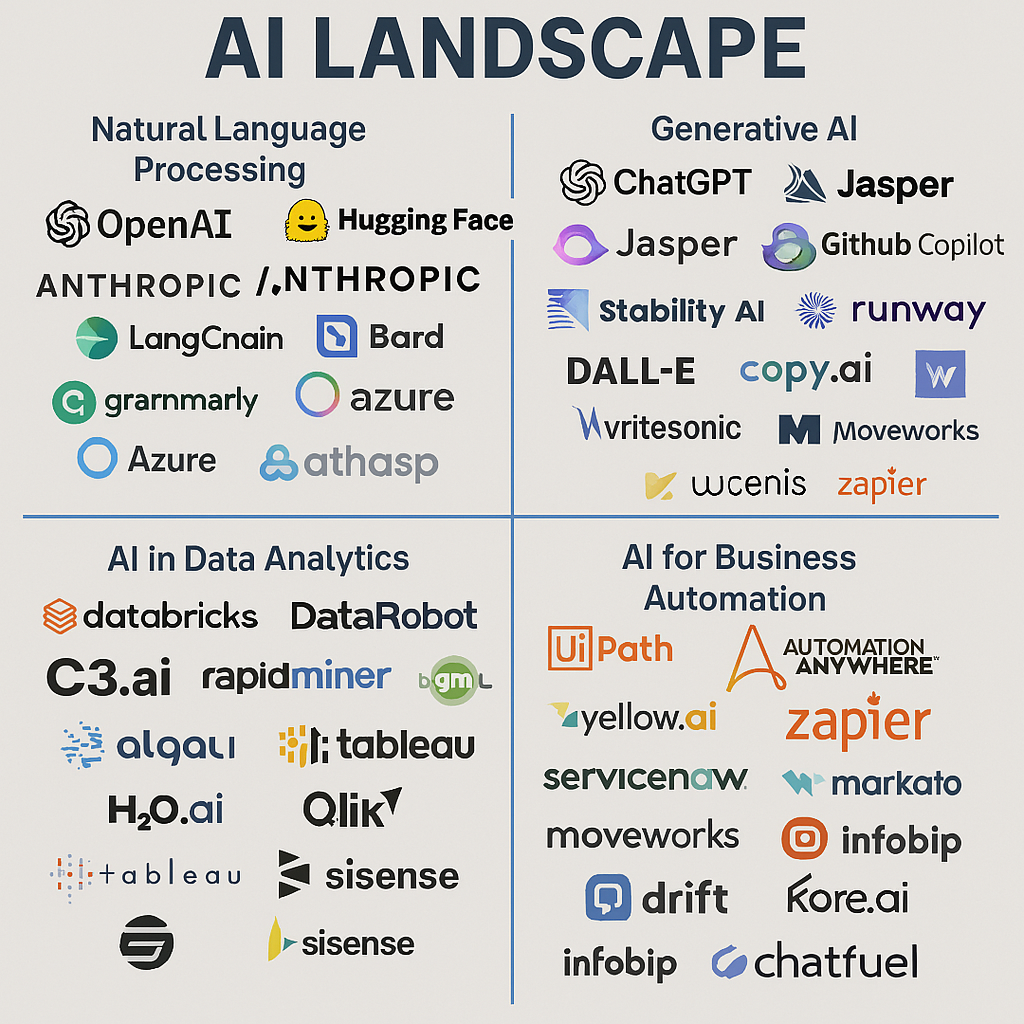Choosing the Right Solutions for Your Business
Artificial Intelligence (AI) is reshaping industries at an unprecedented pace, offering transformative potential across various business functions. However, with an overwhelming number of AI solutions available, companies face significant challenges in selecting, implementing, and optimizing the right technologies. Firstly, take a look at the AI landscape.
Understanding the AI Landscape
AI technologies can be broadly categorized into several key areas, each serving distinct purposes:
- Generative AI (ChatGPT, Gemini, Claude, Llama, GitHub Copilot, Tabnine, Runway ML, Synthesia) – Used for content generation, chatbots, and automation.
- Computer Vision (OpenCV, AWS Rekognition, Google Vision AI) – Enables image and video analysis, facial recognition, and defect detection.
- Natural Language Processing (NLP) (BERT, GPT, SpaCy) – Powers sentiment analysis, language translation, and text summarization.
- Machine Learning & Predictive Analytics (TensorFlow, PyTorch, Scikit-learn) – Used for fraud detection, customer insights, and forecasting.
- AI for Business Automation (UiPath, Automation Anywhere, Blue Prism, Drift, Intercom, Chatfuel) – Drives robotic process automation (RPA) for operational efficiency.
- AI in Data Analytics (Snowflake, Databricks, Alteryx, C3.ai, DataRobot) – Enhances big data processing and business intelligence.

While the possibilities are vast, the key question remains: How should businesses select and integrate AI effectively?
Challenges in AI Adoption
Despite the excitement surrounding AI, businesses often struggle with:
Engineering Limitations: AI adoption requires skilled engineers, but many companies face talent shortages, delaying implementation and optimization.
Choosing the Right AI Solutions: The market is flooded with tools, making it difficult to determine which aligns best with business objectives.
Data Reorganization Risks: AI implementation often requires restructuring existing data architectures, posing security and compliance risks.
A Strategic Approach to AI Implementation
To navigate these complexities, a structured AI adoption strategy is crucial. A good plan includes:
- Assessment & Strategy Development – Identifying key business needs and evaluating the best AI solutions.
- Data Preparation – Ensuring data quality, security, and compliance before AI integration.
- Technology Selection & Pilot Testing – Running proof-of-concept projects to validate AI tools before full-scale deployment.
- Implementation & Engineering Support – Deploying AI models with the necessary technical infrastructure.
- Optimization & Continuous Improvement – Monitoring AI performance and making iterative improvements.
The Value of AI Solution Consultants
Given the complexity of AI adoption, businesses can benefit from solution consultants who provide end-to-end support. These professionals:
- Review existing IT and data infrastructure to ensure AI readiness.
- Design a customized AI strategy aligned with business goals.
- Implement & Operate AI solutions, reducing the burden on in-house teams.
- Optimize AI performance for maximum efficiency and ROI.
DataZap: Your Trusted AI Transformation Partner
For businesses looking to harness AI effectively, DataZap stands out as a trusted partner in AI consulting and implementation. With expertise in AI strategy, engineering, and optimization, DataZap helps companies seamlessly transition into AI-driven operations while allowing them to focus on their core business.
In an era where AI is a game-changer, making the right choices today ensures a competitive edge for tomorrow. Let DataZap guide your AI journey for smarter, more efficient business operations.

